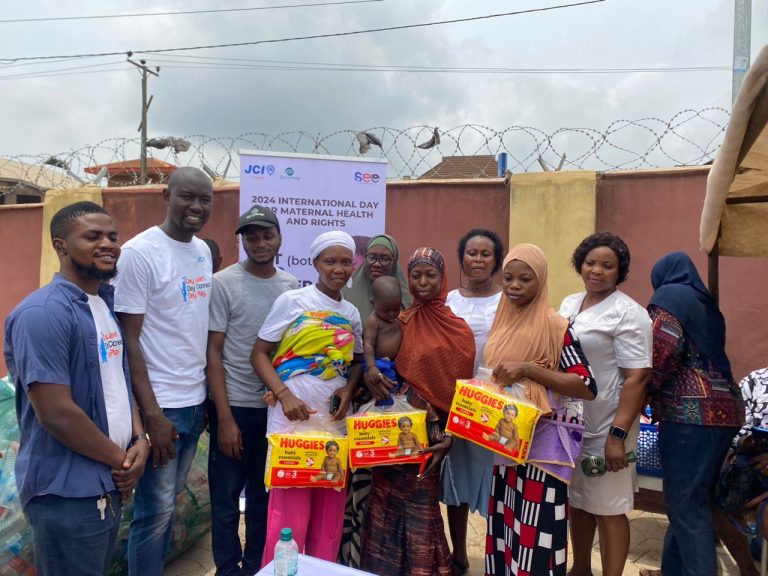In commemoration of International Maternal Health and Rights Day, Junior Chamber International (JCI) Oluyole embarked on a PETs-for-Diapers project, an initiative that seeks to advocate maternal health and rights to support nursing mothers from low-income communities, as well as promote environmental sustainability and waste recycling
The event, which took place at the Aba-Emu Primary Healthcare Centre in Amuloko, Ibadan, saw nursing mothers arriving with bags of PET bottles in hand, ready to participate in the exchange programme.
The matron of the healthcare centre, Alhaja Adeshina, commended JCI Oluyole for its dedication to community welfare and bringing such an initiative to the health centre and community.
Adding value to the event, a representative from Huggies Diaper, guided nursing mothers on the proper usage of diapers, ensuring optimal comfort and care for their infants.
Concurrently, the recycling partners of the project, Recycledge, initiated the collection of PET plastics, while stressing the importance of maintaining a clean environment and promoting recycling practices.
Speaking at the event, the 2024 President of JCI Oluyole, Chikeluba Okonkwo, expressed happiness at the enthusiastic response and cooperation from the nursing mothers, stressing the significance of their willingness to engage with the sensitisation efforts.
Okonkwo noted that the PETs-for-Diapers project is a testament to JCI Oluyole’s commitment to maternal health, environmental sustainability, and community empowerment.
He added that through collaborative efforts and innovative initiatives, JCI Oluyole continues to lead the charge in creating a healthier and more prosperous future for all.
Okonkwo said, “Nursing mothers and newborn babies particularly face a lot of challenges after childbirth, as this stage is characterised by physical, emotional and psychological changes. More so, the state of our environment is another challenge, with improper disposal of various forms of waste that block drainages and waterways and predispose nursing mothers and babies to mosquitoes and other health hazards.
“In recent times, due to the increasing inflation rates, the prices of baby diapers have continued to increase and many women from low-income households are facing socioeconomic hardships that make it difficult for them to easily get baby sanitary wears. Some women go as far as saving money for food to buy diapers and some end up using cheaper alternatives, which are sometimes not hygienic.
“In addressing this abnormality, the PET-for-Diaper project proposes to use PET as a tool to solve maternal health challenges. This project aims to equip infants with baby diapers and vaccines while enlisting nursing mothers as positive change makers by encouraging them to recycle plastics to meet their maternity needs.”
The project’s initiator and team lead, Victor Oyejide, noted that the project, which holds every last Tuesday of the month, aims to curb environmental waste, which causes malaria and other diseases to babies and nursing mothers.
He added that with the current economic situation of the country, most nursing mothers cannot afford diapers for their babies and resort to the use of cheaper and unhygienic alternatives.
Oyejide also noted that the project aims to address the Sustainable Development Goals (SDGs) 3 (good health and wellbeing) and 6 (clean water and sanitation) and expressed delight at the project’s success and the positive impact on the community.
He said, “PETs-for-Diapers is an initiative for women in low-income communities to bring PET bottles from their immediate environment in exchange for diapers, which is an incentive for the plastic waste they are bringing.
“Our focus is addressing maternal healthcare and also address waste management and proper sanitation, as well as touch on recycling of these PETs waste. This has helped us address some of the Sustainable Development Goals (SDGs) as stipulated by the United Nations, contributing our quota.
“This is a sustainable programme and we plan to continue this every month. We look forward to support for subsequent editions to help nursing mothers whose babies are between a few weeks and two years and who reside in low-income communities. PET is a tool for social change.”
Over 165 nursing mothers benefited from the PETs-for-Diapers initiative, receiving packs of diapers to support their infants’ care.
Approximately 150 kg worth of PET plastics were collected, furthering the project’s environmental impact and promoting responsible waste management practices.
